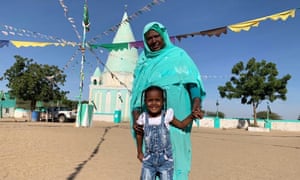{UAH} UK pledges £50m to help end FGM across Africa by 2030
UK pledges £50m to help end FGM across Africa by 2030
Officials say funding is biggest investment in tackling practice and helping vulnerable girls
The British government is to invest £50m in an attempt to end female genital mutilation by 2030, claiming it is the single biggest investment to tackle the issue by an international donor.
The money, announced on Friday, will go to grassroots programmes working to stop the practice across Africa, where it is most prevalent. Penny Mordaunt, international development secretary, said the investment was also key to ending FGM in the UK.
"Inspirational, courageous African women are leading efforts to end the practice in their own countries, and thanks to them, more communities are starting to abandon the practice.
"But progress is at a critical juncture and we must work to protect the millions of girls that are still at risk of being cut. We also can't end FGM in the UK without ending it globally."
At least 200 million girls and womenhave been subjected to FGM – the cutting of female genitals – and an estimated 69 million more girls will be cut over the next 12 years unless action is taken. The UN general assembly has agreed to work to end FGM by 2030 under the sustainable development goals.
The Department for International Development said almost a third of the money (£15m) will be allocated to Sudan, where an estimated 87% of women and girls aged 15 to 49 have undergone FGM.
Brendan Wynne, from Donor Direct Action, which runs an End FGM fund, said: "Such additional funding is incredibly welcome but this time around we have to make sure that it actually reaches those women on the frontlines who are working so hard and so successfully to help end FGM. We should not tell them how to do this, but rather get behind them and support their leadership. They know what they are doing and should be trusted."
In Sudan the money will be used to expand the Saleema Initiative, set up in 2008 by the National Council for Child Welfare and Unicef Sudan. Saleema – "whole" in Arabic – runs 263 clubs at schools where girls, some of whom will already have been cut, discuss FGM and their rights.
Julia Lalla-Maharajh founder of the Orchid Project, a charity campaigning to end FGM, hailed the announcement as "historic".
"This investment couldn't come at a more important time, as we reach a tipping point in many countries, as more and more communities choose to stop cutting their daughters," she said.
"DfID's £50m investment recognises the increasingly urgent need to do more, to prevent girls from having to live with the often lifelong, devastating consequences of FGC [female genital cutting]. It also invests across the whole system of ending the practice, from working with communities for abandonment, through to using religion, legislation and to support work that stops medical workers practising."
According to DfID, the project has already helped to reduce social acceptance of FGM by about 18% in the past two years. Six out of 18 states in Sudan have passed legislation banning FGM, even though a ban at a national level has yet to be passed. The Sudanese Midwifery Council has stopped its members cutting girls.
Malak Abdulrahman al-Awad, age 15, from Um al-Qura, is an active member of the club at her school and has managed to prevent girls undergoing FGM.
"I was cut and all my sisters are cut but I am an active member of the girls' club. Everyone in my school is part of the girls' club. We learned about the reporting of FGM and the consequences and how it is not religious."
When she heard that her cousin was to be cut, she took action: "I went and saw the midwife and saw the girl had already begun to cut the girls. There were lots of girls there who were going to be cut.
"I went to my teacher. He reported this to the authorities who intervened and reported the midwife to the police," she said.
"Then I spoke to the parents of the girls who had not yet been cut and I have told them they should not cut their daughters."
Zeinab Ali, head of education in Malak's home state of El Gezira, said clubs aim to empower girls "to have strong opinions in front of their mothers and grandmothers", who usually make the decisions to have their daughters and granddaughters cut.
One mother, Aisha Dawoud, told the Guardian she now regretted having her only daughter cut when she was six.
"My daughter was sick and some people advised me that if I cut her she will be fine. I wish I hadn't done it. I saw the consequences of being cut on myself, because it was very hard to give birth and during my period too.
"If I had another daughter, I won't cut her," she said.
Disclaimer:Everyone posting to this Forum bears the sole responsibility for any legal consequences of his or her postings, and hence statements and facts must be presented responsibly. Your continued membership signifies that you agree to this disclaimer and pledge to abide by our Rules and Guidelines.To unsubscribe from this group, send email to: ugandans-at-heart+unsubscribe@googlegroups.com









0 comments:
Post a Comment